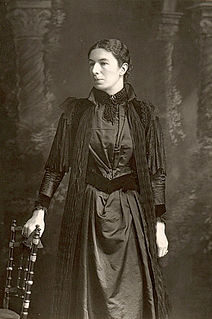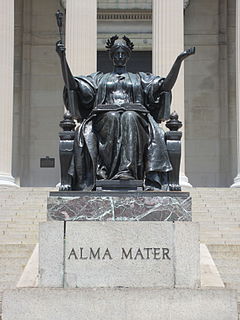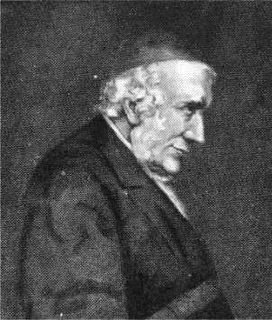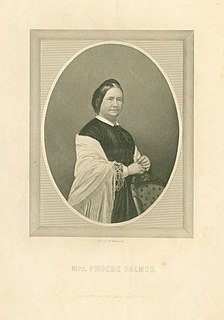Related Research Articles

Bede, also known as Saint Bede, The Venerable Bede, and Bede the Venerable, was an English monk at the monastery of St. Peter and its companion monastery of St. Paul in the Kingdom of Northumbria of the Angles.

Oscar Greeley Clendenning Hammerstein II was an American lyricist, librettist, theatrical producer, and director in the musical theater for almost 40 years. He won eight Tony Awards and two Academy Awards for Best Original Song. Many of his songs are standard repertoire for vocalists and jazz musicians. He co-wrote 850 songs.
The Anti-Masonic Party, also known as the Anti-Masonic Movement, was the earliest third party in the United States. Formally a single-issue party, it strongly opposed Freemasonry, but it later aspired to become a major party by expanding its platform to take positions on other issues. After emerging as a political force in the late 1820s, most of the Anti-Masonic Party's members joined the Whig Party in the 1830s and the party disappeared after 1838.
Transcendentalism is a philosophical movement that developed in the late 1820s and 1830s in New England. A core belief is in the inherent goodness of people and nature, and while society and its institutions have corrupted the purity of the individual, people are at their best when truly "self-reliant" and independent. Transcendentalists saw divine experience inherent in the everyday, rather than believing in a distant heaven. Transcendentalists saw physical and spiritual phenomena as part of dynamic processes rather than discrete entities.

Rodgers and Hart were an American songwriting partnership between composer Richard Rodgers (1902–1979) and the lyricist Lorenz Hart (1895–1943). They worked together on 28 stage musicals and more than 500 songs from 1919 until Hart's death in 1943.

Mary Augusta Ward was a British novelist who wrote under her married name as Mrs Humphry Ward. She worked to improve education for the poor and she became the founding President of the Women's National Anti-Suffrage League.
A carol is a festive song, generally religious but not necessarily connected with church worship, and sometime accompanied by a dance. A caroller is someone who sings carols, and is said to be carolling.

Julia Ward Howe was an American poet and author, known for writing the "Battle Hymn of the Republic" and the original 1870 pacifist Mother's Day Proclamation. She was also an advocate for abolitionism and a social activist, particularly for women's suffrage.

Alma mater is an allegorical Latin phrase currently used to identify a school, college or university that one formerly attended, or graduated from. The phrase is variously translated as "nourishing mother", "nursing mother", or "fostering mother", suggesting that a school provides intellectual nourishment to her students.

The Oxford Movement was a movement of high church members of the Church of England which eventually developed into Anglo-Catholicism. The movement, whose original devotees were mostly associated with the University of Oxford, argued for the reinstatement of some older Christian traditions of faith and their inclusion into Anglican liturgy and theology. They thought of Anglicanism as one of three branches of the "one, holy, catholic, and apostolic" Christian church. By the 1840s many participants decided that the Anglican Church lacked grace, and converted to Roman Catholicism.

Tarkus is the second studio album by English progressive rock band Emerson, Lake & Palmer, released in June 1971 on Island Records. Following their 1970 European tour, the group returned to Advision Studios in London, in January 1971, to prepare material for a follow-up. Side one has the seven-part "Tarkus", with a collection of shorter tracks on side two.

A chocolate brownie or simply a brownie is a square or rectangular chocolate baked confection. Brownies come in a variety of forms and may be either fudgy or cakey, depending on their density. Brownies often, but not always, have a glossy "skin" on their upper crust. They may also include nuts, frosting, cream cheese, chocolate chips, or other ingredients. A variation made with brown sugar and vanilla rather than chocolate in the batter is called a blond brownie or blondie. The brownie was developed in the United States at the end of the 19th century and popularized there during the first half of the 20th century.

Phoebe Palmer was a Methodist evangelist and writer who promoted the doctrine of Christian perfection. She is considered one of the founders of the Holiness movement within Methodist Christianity.
Henry Nash Smith was a scholar of American culture and literature. He was co-founder of the academic discipline "American studies". He was also a noted Mark Twain scholar, and the curator of the Mark Twain Papers. The Handbook of Texas reported that an uncle encouraged Smith to read at an early age, and that the boy developed an interest in the works of Rudyard Kipling, Robert L. Stevenson and Mark Twain.
Hitchy-Koo of 1919 is a musical revue with music and lyrics by Cole Porter and a book by George V. Hobart. This revue was third in a series of four Hitchy-Koo revues from 1917 to 1920 produced by, and starring, Raymond Hitchcock. The original Broadway production of this version played in 1919. The revue received favourable reviews.
Bernard Mordaunt Ward was a British author and third-generation soldier most noted for his support of the Oxfordian theory of Shakespeare authorship and writing the first documentary biography of Edward de Vere, 17th Earl of Oxford.
Roy Ernest Palmer was a singer, teacher, folklorist, author and historian who wrote more than 30 books on folklore and folk song. In 2003 he was awarded the Gold Badge, the English Folk Dance and Song Society's highest honour.
Floy Little Bartlett was an American composer. She wrote many compositions, with one of them appearing in the 1925 silent film The Big Parade. Bartlett also wrote a book for children in 1931 titled The Busy Book.
Siesta is a short piece for small orchestra, written by William Walton and premiered in 1926. It was later used for a ballet by Frederick Ashton. Walton was a devotee of Italy, and its influence is apparent in this work.
References
- ↑ William Harmon (ed) (1979). The Oxford book of American light verse . Oxford University Press. ISBN 978-0-19-502509-5.
{{cite book}}:|author=has generic name (help) - ↑ Studwell, William Emmett (1997). The Americana Song Reader. Psychology Press. p. 9. ISBN 0789001500.
- ↑ Jasen, David A. (2003). Tin Pan Alley: An Encyclopedia of the Golden Age of American Song. Taylor & Francis. p. 184. ISBN 0203502469.
- ↑ Raph, Theodore (1986). The American Song Treasury. Courier Dover Publications. p. 244. ISBN 0486171337.